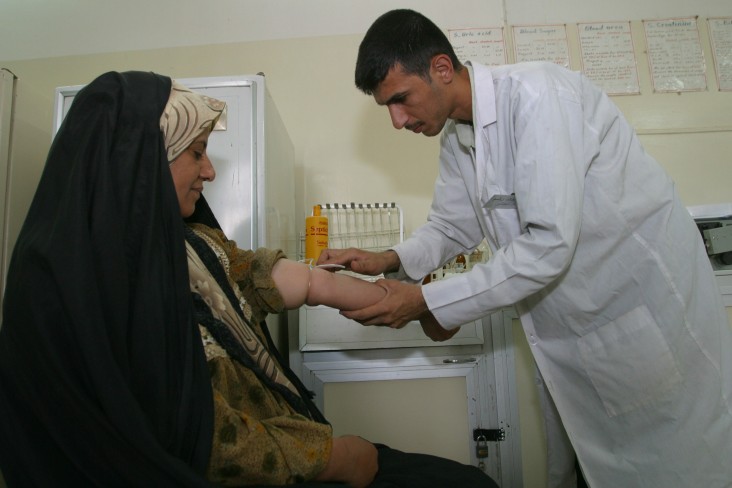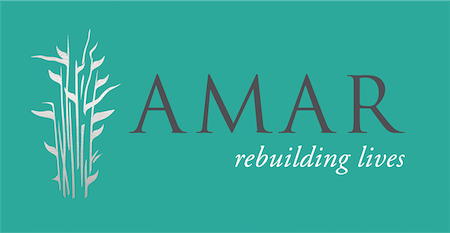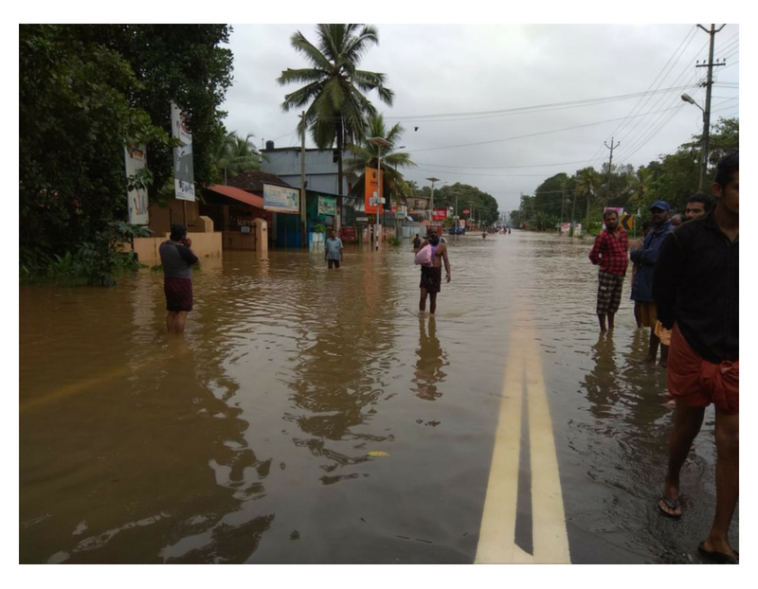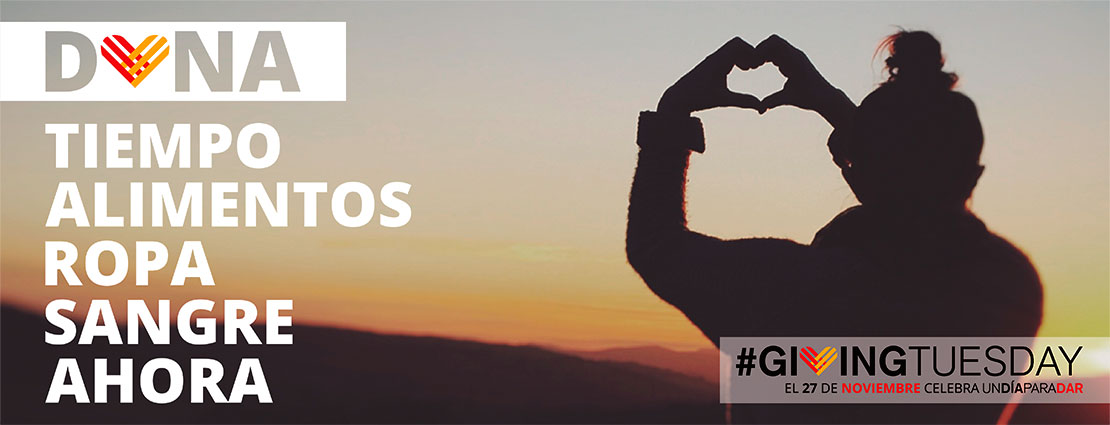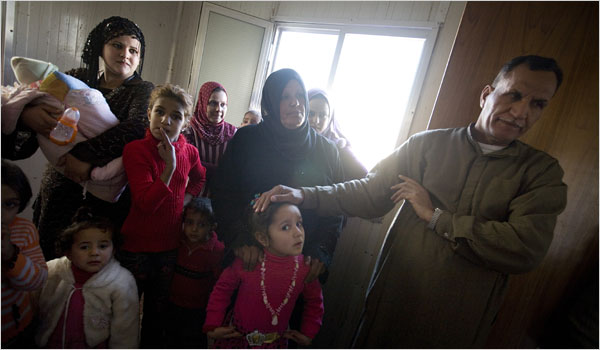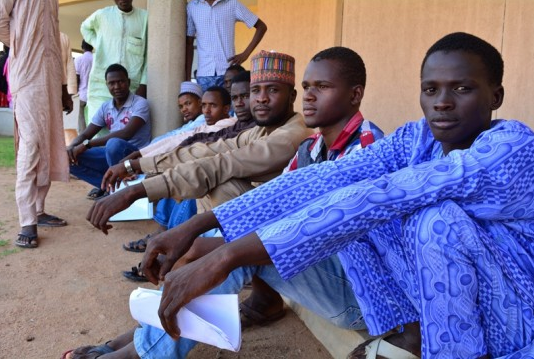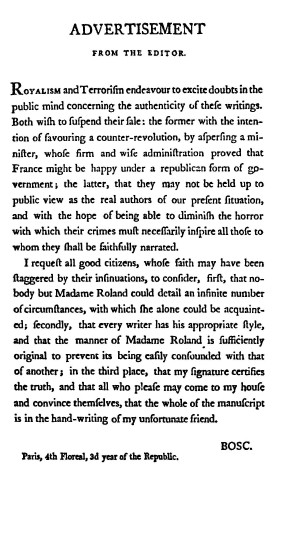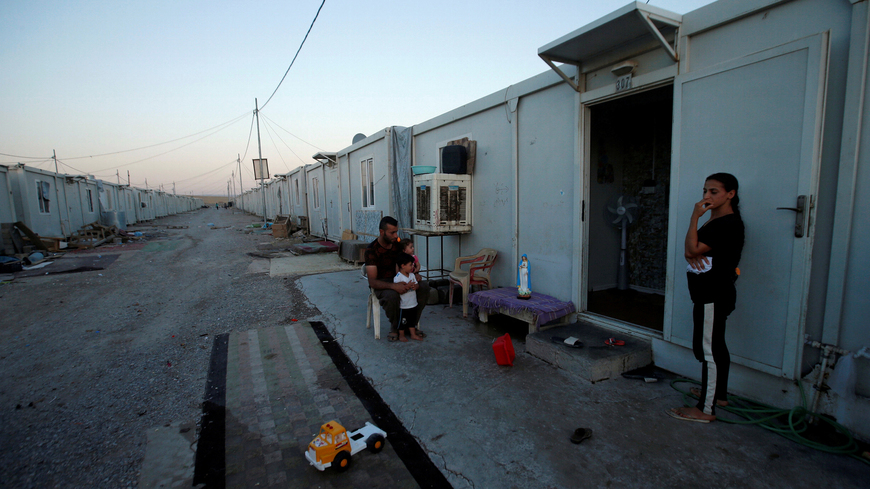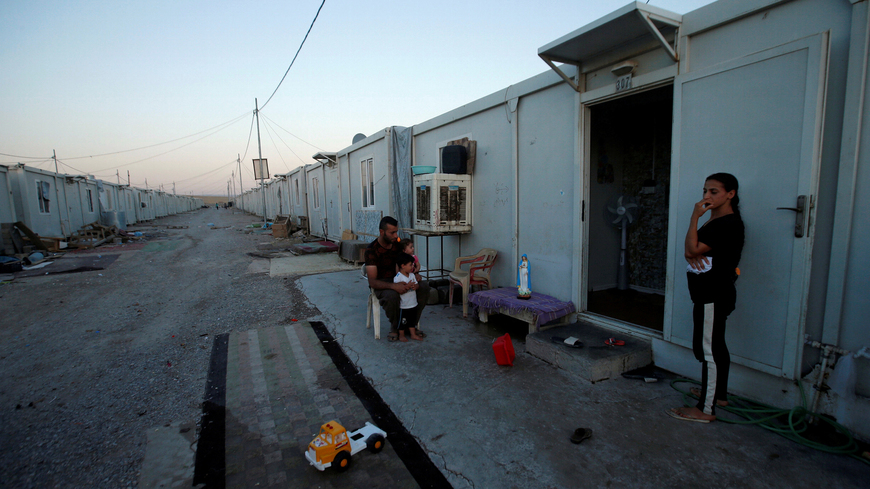UNDP is rehabilitating Tikrit Teaching Hospital and improving access to healthcare for millions of Iraqis in areas that were under ISIL control.
Latest threat to Displaced Children in Iraq: Winter
As Nadia Murad (pictured), the Yazidi activist and survivor of gender-based violence is honored with the Nobel Prize for Peace, UNICEF is calling attention to the plight of hundreds of thousands of internally displaced children in Iraq whose lives are threatened by freezing temperatures and floods that have affected large parts of the country.
“As the world celebrates Nadia Murad’s incredible story of survival and her work for human rights, let us remember that there are many vulnerable children in Iraq who still need our support, even if the worse of the violence may be over” said Peter Hawkins, UNICEF Representative in Iraq.
Winters in Iraq are harsh. It rains and snows and temperatures can fall below zero in the northern part of the country, where a majority of Yazidi and other displaced children live. Most displaced families live below the poverty line, in dilapidated housing with poor heating, or in camps with little protection from the cold. It impossible to afford fuel for heating and winter clothing to keep their children warm.
“The devastating floods have made this winter even more difficult for displaced children who are extremely vulnerable to hypothermia and respiratory diseases. No child should be subjected to such risks. Every child deserves to be warm and healthy,” added Mr. Hawkins.
UNICEF is providing winter clothes, including boots, scarves, and hats to approximately 161,000 children in Sinjar, Erbil, Dohuk, Ninawa, Anbar, Diwaniya, Basra, Salaheddin, Baghdad and Suleimaniah, including through cash support.
UNICEF’s winter campaign aims to reach the most vulnerable children aged between three months and 14 years living in camps for the internally displaced and in hard-to-reach areas.
(Source: UN)
AMAR Christmas Appeal is now LIVE!
Years of war and the invasion of ISIS have torn through the fabric of family life in Iraq: loved ones have been lost, homes destroyed, communities ripped apart.
One of the most devastating effects has been the vast numbers of children left without parents.
The AMAR International Charitable Foundation has been delivering medical and educational support to these orphans and families, but we need your help to continue.
This Christmas families all over the world will come together to share in the warmth, pleasure and love surrounding the festivities. Together under one roof, they’ll celebrate, enjoy hearty meals, exchange gifts.
But for many in Iraq there can be no such celebration. Their lives have been devastated by conflict and persecution. Almost 2 million remain displaced.
One of the most devastating consequences has been the vast numbers of children left without parents. They have been left traumatised and unprotected, and risk becoming forgotten casualties of the war.
This Christmas families all over the world will come together to share in the warmth, pleasure and love surrounding the festivities. Together under one roof, they’ll celebrate, enjoy hearty meals, exchange gifts.
But for many in Iraq there can be no such celebration. Their lives have been devastated by conflict and persecution. Almost 2 million remain displaced.
One of the most devastating consequences has been the vast numbers of children left without parents. They have been left traumatised and unprotected, and risk becoming forgotten casualties of the war.
How can I help?
£14 for an emergency winter blanket
£85 for food box feeding a family for a month
£49 for a Woman Health Volunteer to travel and visit families for a month
£77 for one adult wheelchair
£290 for an English teacher for a month
£244 for an ambulance driver for a month
(Source: AMAR)
WHO provides Urgent Support for Victims of Flooding
The World Health Organization (WHO) has conducted an urgent needs-assessment mission to Qayyarah’s Jadaa internally displaced person (IDP) camps in Ninewa governorate to assess the health situation of the population affected by the heavy rain which caused flash flooding in a number of IDP camps in the governorate.
Tens of thousands of families have lost all their belongings and are reported to be in dire need of food, drinking water, medicine, and hygiene kits.
A slight increase in the number of upper respiratory tract infection cases were reported in the visited camps and health partners there were notified to monitor the situation and immediately report any change in communicable disease trends through the WHO Early Warning Alert and Response Network (EWARN).
“WHO is working closely with partners and local health authorities to manage the emergency and meet the urgent health and sanitation needs of thousands of families hit by the flash floods in Ninewa and Salah al-Din governorates,” said Dr Adham Rashad, Acting WHO Representative in Iraq. “The situation requires a collective humanitarian effort and a quick reaction to minimize risks and contain the damage,” he added.
A shipment of blankets has been delivered to IDP camps in the district of Qayyarah and medical supplies, kits, and ambulances are on the way for deployment to badly affected areas in the affected governorates.
As of 23 November, heavy rain has hit the country causing flash floods that have led to the damage of property, livestock, and infrastructure in Ninewa, Salah Eldin and the southern governorates of Missan, Wasit and Basrah. A number of bridges, roads, and villages were inundated and more than 10 000 people in Salah Eldin and 15 000 people in Ninewa governorates are in urgent need of assistance, including thousands of families living in IDP camps.
WHO remains ready to support the Ministry of Health and local health authorities to address the impact of the floods and reduce the suffering of the vulnerable populations in the IDP camps and other under-recovery areas in Ninewa and Salah al-Din governorates.
(Source: UN)
Giving Tuesday: Choose Iraqi Kids!
It’s here! #Giving Tuesday!
Make a high impact gift to Iraqi orphans and vulnerable children today.
How? $40,000 is available in matching funds for education, nutrition, legal protection, medical care, and psychosocial support for orphans, street kids, and displaced children.
Donate $25, $50, $100, or more and get a 100% match PLUS, for every $25 donated, a girl or boy gets a gift of a doll or soccer ball.
Watch this video: Their smiles belong to you!
(Source: Iraqi Children Foundation)
Please Support Widows and Orphans in the Middle East
By Robert Cole, for the AMAR International Charitable Foundation.
For hundreds of millions of families around the world, this month’s Mawlid al-Nabi commemoration to mark the Prophet Mohammed’s birthday will be a time for family, friends, joy and celebration. A time of prayer, exchanging gifts, embracing the wider community and extending to others their religious generosity.
But for millions more, particularly widows and children, there will be no celebration as they continue their battle against war, hunger, and disease.
In Iraq alone, there are one million widows and, tragically, more than four million orphans.
AMAR International has been delivering urgent medical and educational support in the Middle East for the last 26 years. Using a staff comprised almost entirely of national professionals and volunteers, they have treated more than 10 million patients and have opened 46 medical centres across Iraq.
But we couldn’t have done any of this without your help. Today we are launching a new, urgent appeal for emergency funds to help widows and orphans in the most desperate need.
(Source: AMAR)
UNDP Supporting Women Survivors of Trauma
UNDP Supporting Women CRSV and SGBV Survivors of Trauma
After a long process of a series training and consultations meetings which started in October 2017 targeting 114 female social workers in collaboration with the Iraqi Ministry of Labor and Social Affairs/ Directorate of women protection, UNDP started developing a national analytical report for women survivors of Conflict-Related Sexual Violence (CRSV) and Sexual and gender based violence (SGBV) in Iraq.
Through an advanced training on expressing writing and listening skills to collect women stories, social workers as first responders were capacitated on appropriate approaches for conducting interviews with survivors and how to handle potential challenges, such as the re-traumatization of survivors. These techniques enable women to share their stories, detail their needs, make their demands for rehabilitation and compensation in a sensitive and secure environment.
The next stage will be collecting stories by MOLSA social workers of women CRSV /SGBV survivors in Ninewah, Salahaldeen, Diyala, Anbar, Baghdad, Karbalaa, Babil, Misan, Kirkuk and Basrah. These stories will be analyzed to develop a national analytical report to be approved and adopted by the government. This report will be one of the resources that will inform efforts of the Iraqi government to strengthen its social protection and transitional justice policies.
H.E Minister Mohammad Shiaa Alsoudany said: “Iraqi women faced many challenges in life, hence the Government with all its institutions as well as the local and international community must stand with the Iraqi women, who represent patience, strength and willing to move forward in life, in their long and painful journey. He added that. Mr. Alsoudany stated, “Many women are exposed to violence and cannot speak out, which leads to psychological effects reflected on their families as well”.
UNDP’s Gender Specialist, Ms. Sundus Abbas said: “In Iraq, the biggest obstacle facing reconciliation is dealing with the past in ways that make a fresh start possible. Expressive Writing in Dealing with the Past is a key methodology in achieving community reconciliation in Iraq’s post-conflict environment which help increasing the well-being of groups at risk”. She added: “Women voices, roles and stories are often ignored; therefore, we came up with this initiative to reach out to a wider group of women and listen to their stories through our newly-established partnership with the MOLSA team of female social workers”.
Senior Undersecretary of the Ministry of Labor and Social Affairs Mr. Falih Al-Amiry highlighted that “social workers play an active role in showcasing what is happening within the society especially civilians that been subjected to violence”. adding that: “this kind of documentation is much needed now in Iraq especially in post liberation phase”.
Mrs. Uttor Almusawi, Director General of Women Social Protection Department at the Ministry of Labor and Social Affairs explained that, “women are the most targeted group in Iraq; therefore, we hope to be able to reach out to all women who have experienced violence through our teams of social workers across Iraq. With UNDP’s support, we count on this project to help women victims to document their stories and to draw lessons through this initiative for future use. We also want to record all stories of those who play an active role as peace builders in their communities. And we are interested, not only in individual stories, but also those of communities”. She added that: “This is one of our main responsibilities in the department of Women Social Protection”.
Bedaa Mohammed, a 36 years old social worker has been working in Baghdad for the last 7 years. She commented: “Women usually keep their stories and their communities’ stories in their hearts, especially when it refers to sexual violence. This is our role as social workers to help them in dealing with this dark past and document their stories. Expressive Writing in Dealing with the Past approach is a very important tool, especially in our current situation. This initiative gave me many new skills, and I feel that I can contribute with my colleagues in documenting Iraqi history”.
Though its Support to Integrated Reconciliation in Iraq Project, the UNDP is working in partnership with the Implementation and Follow-up Committee for National Reconciliation to develop, support and sustain civic participation in reconciliation and transitional justice processes at every level of society, with a focus on communities. The project is comprising three main pillars: 1) Public Awareness Raising 2) Local Peace mechanisms, processes and committees and 3) Documenting the experiences, needs and demands of Iraqi citizens for reconciliation with special emphasis on the redress of sexual and gender violence during previous conflicts.
(Source: UNDP)
Urgent AMAR Appeal for Widows and Orphans
For hundreds of millions of families around the world, the recent Eid celebrations were a time for family, friends, joy and celebration. A time of prayer, exchanging gifts, embracing the wider community and extending to others their religious generosity.
But for millions more, particularly widows and children, there could be no celebration as they continued their battle against war, hunger, disease.
In Iraq alone, there are one million widows and, tragically, more than four million orphans.
AMAR International has been delivering urgent medical and educational support in the Middle East for the last 26 years.
Using a staff comprised almost entirely of national professionals and volunteers, they have treated more than 10 million patients and have opened 46 medical centres across Iraq.
To commemorate this Summer’s Eid al-Fitr and Eid al-Adha, we are launching an urgent appeal for emergency funds to help many more people in desperate need of your support.
Please donate by clicking here, or by using this donation form.
Iraq launches Social Fund to Fight Poverty
By Adnan Abu Zeed for Al Monitor. Any opinions expressed here are those of the author and do not necessarily reflect the views of Iraq Business News.
The Iraqi Ministry of Planning announced the launch of the Social Fund for Development on Sept. 23, with initial capital of $300 million, in cooperation with the World Bank.
The project aims to improve the living conditions of Iraq’s poor. High poverty rates in Iraq have led to repeated protests for 15 years calling for improving the standard of living and for more employment opportunities. These protests have resulted in dozens of deaths and injuries.
A May 2018 World Bank report noted that Iraq’s population of 38.5 million sits at the poverty line with a poverty rate of 22.5%. The spokesman for the Iraqi Ministry of Labor and Social Affairs, Ammar Menem, told Al-Monitor that this high rate is due to “exceptional security conditions ensuing from the war and its costs, as well as to the slump in oil prices. This resulted in the cessation of funding of projects for the rehabilitation of unemployed persons, a lack of investment projects and faltering economic growth.”
Iraq launches Social Fund to Fight Poverty
By Adnan Abu Zeed for Al Monitor. Any opinions expressed here are those of the author and do not necessarily reflect the views of Iraq Business News.
The Iraqi Ministry of Planning announced the launch of the Social Fund for Development on Sept. 23, with initial capital of $300 million, in cooperation with the World Bank.
The project aims to improve the living conditions of Iraq’s poor. High poverty rates in Iraq have led to repeated protests for 15 years calling for improving the standard of living and for more employment opportunities. These protests have resulted in dozens of deaths and injuries.
A May 2018 World Bank report noted that Iraq’s population of 38.5 million sits at the poverty line with a poverty rate of 22.5%. The spokesman for the Iraqi Ministry of Labor and Social Affairs, Ammar Menem, told Al-Monitor that this high rate is due to “exceptional security conditions ensuing from the war and its costs, as well as to the slump in oil prices. This resulted in the cessation of funding of projects for the rehabilitation of unemployed persons, a lack of investment projects and faltering economic growth.”

